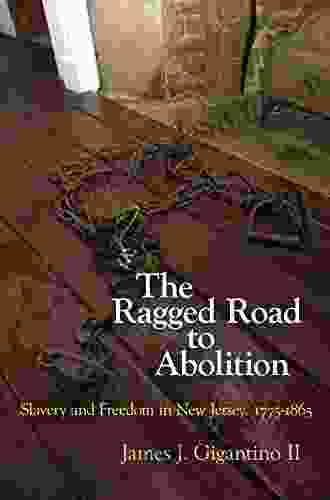Slavery and Freedom in New Jersey, 1775-1865: An Exploration into the Peculiar Institution and the Struggle for Equality

4.5 out of 5
| Language | : | English |
| File size | : | 9242 KB |
| Text-to-Speech | : | Enabled |
| Enhanced typesetting | : | Enabled |
| Word Wise | : | Enabled |
| Print length | : | 370 pages |
| Screen Reader | : | Supported |
New Jersey, often hailed as the "Crossroads of the American Revolution," played a multifaceted role in the history of slavery and freedom in the United States. Deeply intertwined with the institution of slavery from its colonial beginnings, New Jersey witnessed the rise of the abolitionist movement and became a battleground in the fight for emancipation. This article delves into the complex tapestry of slavery and freedom in New Jersey from 1775 to 1865, examining the state's evolving attitudes towards slavery, the experiences of enslaved and free Black communities, and its contributions to the national struggle for equality.
The Legacy of Slavery in New Jersey
Slavery existed in New Jersey from the 17th century, brought by Dutch and English colonists who enslaved African and Native American people. By the time of the American Revolution, an estimated 10-12% of the state's population was enslaved. Enslaved individuals toiled on farms, in workshops, and as domestic servants, performing essential labor that fueled the colony's economy.
Despite the presence of slavery, New Jersey also had a long-standing tradition of Quaker opposition to the institution. Quakers, motivated by their religious beliefs, began to speak out against slavery in the mid-18th century. Their activism played a significant role in shaping the state's evolving views on slavery.
The Revolutionary Era and the Fight for Freedom
The American Revolution brought the issue of slavery to the forefront of public discourse. As the colonies fought for their independence from Great Britain, enslaved individuals seized the opportunity to seek their own freedom. Many joined the Continental Army, fighting alongside white soldiers for the promise of emancipation.
New Jersey's role in the Revolution was complex. While the state did not officially abolish slavery during the war, it passed several measures that weakened the institution, such as the Gradual Emancipation Act of 1786. This act provided for the gradual freeing of enslaved children born after a certain date, but it also allowed their enslavement until they reached the age of 25.
The Rise of the Abolitionist Movement
The post-Revolutionary era witnessed the rise of the abolitionist movement, which gained significant traction in New Jersey. Led by Quakers and other religious groups, abolitionists campaigned for the immediate and unconditional end of slavery. They organized petitions, held public meetings, and published anti-slavery literature.
New Jersey became a hotbed of abolitionist activity. The state was home to numerous abolitionist societies and newspapers, and it played a key role in the Underground Railroad, a network that helped enslaved people escape to freedom in the North.
The Civil War and the End of Slavery
The outbreak of the Civil War in 1861 brought the issue of slavery to a head. New Jersey initially declared its neutrality, but it soon joined the Union cause. The state's contributions to the war effort included sending troops to fight and providing financial support.
In 1865, the ratification of the Thirteenth Amendment to the U.S. Constitution abolished slavery throughout the United States, including New Jersey. The end of slavery marked a watershed moment in the state's history, but the legacy of the institution continued to shape the lives of Black communities in New Jersey and beyond.
The Legacy of Slavery and Freedom
The history of slavery and freedom in New Jersey is a complex and multifaceted one. The state played a pivotal role in the fight against slavery and the emergence of the abolitionist movement. However, the legacy of slavery continued to impact Black communities in New Jersey long after the institution was abolished.
Today, New Jersey is a diverse and vibrant state that celebrates its rich history and continues to grapple with the legacy of slavery and the ongoing struggle for racial justice. Museums, historical sites, and educational institutions across the state commemorate the experiences of enslaved and free Black communities and highlight the state's role in the fight for equality.
The history of slavery and freedom in New Jersey is a testament to the resilience and determination of the human spirit. From the horrors of slavery to the triumphs of the abolitionist movement and the ongoing struggle for equality, New Jersey has played a pivotal role in shaping the course of American history. By exploring the complex narratives of slavery and freedom, we gain a deeper understanding of our past and the challenges that still confront us today.
4.5 out of 5
| Language | : | English |
| File size | : | 9242 KB |
| Text-to-Speech | : | Enabled |
| Enhanced typesetting | : | Enabled |
| Word Wise | : | Enabled |
| Print length | : | 370 pages |
| Screen Reader | : | Supported |
Do you want to contribute by writing guest posts on this blog?
Please contact us and send us a resume of previous articles that you have written.
 Book
Book Novel
Novel Page
Page Chapter
Chapter Text
Text Story
Story Genre
Genre Reader
Reader Library
Library Paperback
Paperback E-book
E-book Magazine
Magazine Newspaper
Newspaper Paragraph
Paragraph Sentence
Sentence Bookmark
Bookmark Shelf
Shelf Glossary
Glossary Bibliography
Bibliography Foreword
Foreword Preface
Preface Synopsis
Synopsis Annotation
Annotation Footnote
Footnote Manuscript
Manuscript Scroll
Scroll Codex
Codex Tome
Tome Bestseller
Bestseller Classics
Classics Library card
Library card Narrative
Narrative Biography
Biography Autobiography
Autobiography Memoir
Memoir Reference
Reference Encyclopedia
Encyclopedia Janet Sharp Hermann
Janet Sharp Hermann Jane T Merritt
Jane T Merritt Jay Liebowitz
Jay Liebowitz Jan Leja
Jan Leja Jean Leinhauser
Jean Leinhauser Jason J Jacobsen
Jason J Jacobsen Jason Mcclellan
Jason Mcclellan Jake Halpern
Jake Halpern James R Gaines
James R Gaines James Stevens Curl
James Stevens Curl Jamie Wolf
Jamie Wolf Jay Earley
Jay Earley James P Carse
James P Carse James Minter
James Minter Jan H Jensen
Jan H Jensen Jason Calacanis
Jason Calacanis James Kinnear
James Kinnear James F Woodward
James F Woodward Jeannine R Studer
Jeannine R Studer James R Mcdonough
James R Mcdonough
Light bulbAdvertise smarter! Our strategic ad space ensures maximum exposure. Reserve your spot today!
 Max TurnerFollow ·3.7k
Max TurnerFollow ·3.7k Hunter MitchellFollow ·10.5k
Hunter MitchellFollow ·10.5k Avery SimmonsFollow ·4.8k
Avery SimmonsFollow ·4.8k Arthur Conan DoyleFollow ·8.6k
Arthur Conan DoyleFollow ·8.6k Chase SimmonsFollow ·10.1k
Chase SimmonsFollow ·10.1k Leon FosterFollow ·4.6k
Leon FosterFollow ·4.6k Jackson HayesFollow ·10.2k
Jackson HayesFollow ·10.2k Richard WrightFollow ·3.7k
Richard WrightFollow ·3.7k

 Jacob Foster
Jacob FosterPrinciples and Persons: The Legacy of Derek Parfit
Derek Parfit's 1984 book,...

 Leo Mitchell
Leo MitchellPartners For Life: Raise Support For Your Missionary Work...
Are you a missionary or ministry leader...

 Blake Kennedy
Blake KennedyOn Desperate Ground: A Gripping Account of World War II's...
Hampton Sides' "On...

 Duane Kelly
Duane KellyCriminal Minds Sociopaths Serial Killers And Other...
In the realm of criminology,...

 Craig Blair
Craig BlairHome Repair: The Ultimate Guide to Fix, Maintain, and...
Welcome to the...

 Elmer Powell
Elmer PowellThe Organic Grower Guide to Mycorrhizae Science for...
Unlock the Secrets of Soil...
4.5 out of 5
| Language | : | English |
| File size | : | 9242 KB |
| Text-to-Speech | : | Enabled |
| Enhanced typesetting | : | Enabled |
| Word Wise | : | Enabled |
| Print length | : | 370 pages |
| Screen Reader | : | Supported |












